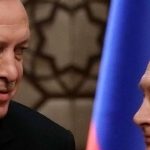The same day Turkey’s central bank turned down President Recep Tayyip Erdogan’s exhortations to cut interest rates, the parliament granted him emergency powers to act as he sees fit in the event any “negative development” threatens the country’s financial stability. Lawmakers also created a new Financial Stability and Development Committee, but the president has the authority to second-guess its recommendations.
This was unwise, and not only because the president harbors eccentric notions about economics and finance, notably his unshakable belief that high interest rates are the source of “every evil in an economy.” (The central bank recognizes that rates need to stay high — the benchmark is now 24 percent — in order to curb rampant inflation.)
Erdogan already has too much control over the levers of the economy. Last summer, as he started his second term as president, he claimed by decree the exclusive power to name the governor of the central bank, as well as hundreds of other officials. In the process, he sidelined people widely regarded as market-friendly, including former deputy prime minister Mehmet Simsek and former finance minister Naci Agbal. Dismayed investors were not reassured when Erdogan appointed his son-in-law, Berat Albayrak, to lead the new ministry of treasury and finance.
These measures aggravated an ongoing economic and currency crisis in Turkey, drastically devaluing the lira.
With the Turkish economy now heading toward its first recession in a decade, this is an especially inopportune moment for the president to assume even greater authority over the economy.
Municipal elections in March will give voters a chance to express their frustrations over the state of the economy, and will be seen as a vote of confidence — or lack thereof — in Erdogan’s presidency. Ahead of that vote, investors need to trust that Erdogan will not put his finger on the scales. To provide this reassurance, Erdogan should appoint independent-minded technocrats to the new financial stabilization committee, ensure that the committee’s deliberations are transparent, and pledge to act on its guidance.
He would also be wise also to commit to honoring the central bank’s independence. Turkey’s economic recovery depends on it.
Source: Bloomberg



